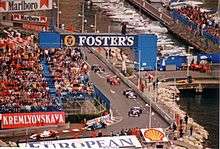Parade lap

A parade lap, also known as a pace lap, formation lap or warm-up lap, is a lap before a motorsport race begins, in which the drivers go around the track at a slow speed (usually between 50 and 120 km/h), and, in some cases, behind the safety car. The lap is to ensure that track conditions are safe, and that there are no dangerous problems with the cars (including the safety car) or the circuit. The parade lap either leads to a rolling start, standing start, or back to the grid. Short circuits (such as the Brands Hatch Indy circuit layout) often have two of these laps. Overtaking is usually permitted on these laps in motorcycle racing, but not in car racing.
In Formula One, the official title is formation lap. Any car which fails to leave the grid before the last qualifier has moved away is required to start from either the pit lane or the back of the grid. In MotoGP and the Superbike World Championship, it is known as the warm-up lap.
The lap allows the cars to warm up their tyres, which is crucial in order to be competitive during the race. Drivers will often attempt to warm up the tyres more quickly during the lap, by steering slowly from side to side, and sometimes also their brakes. In NASCAR, the parade lap is referenced as a pace lap, and safety car speed is the same as the pit lane speed limit.
Dramas are not unknown on these laps however. At the 1999 Indianapolis 500, a collision on the formation lap eliminated three cars. At the 1996 French Grand Prix the Ferrari of pole position qualifier Michael Schumacher stopped with an engine fault. At the 1991 San Marino Grand Prix Alain Prost and Gerhard Berger both went off the track in wet conditions; Berger rejoined and retook his grid position, but Prost stalled and was immediately out of the race. At the 2009 Valencian MotoGP, Ducati rider Casey Stoner crashed at the second turn of the Circuit Ricardo Tormo, and missed the race.